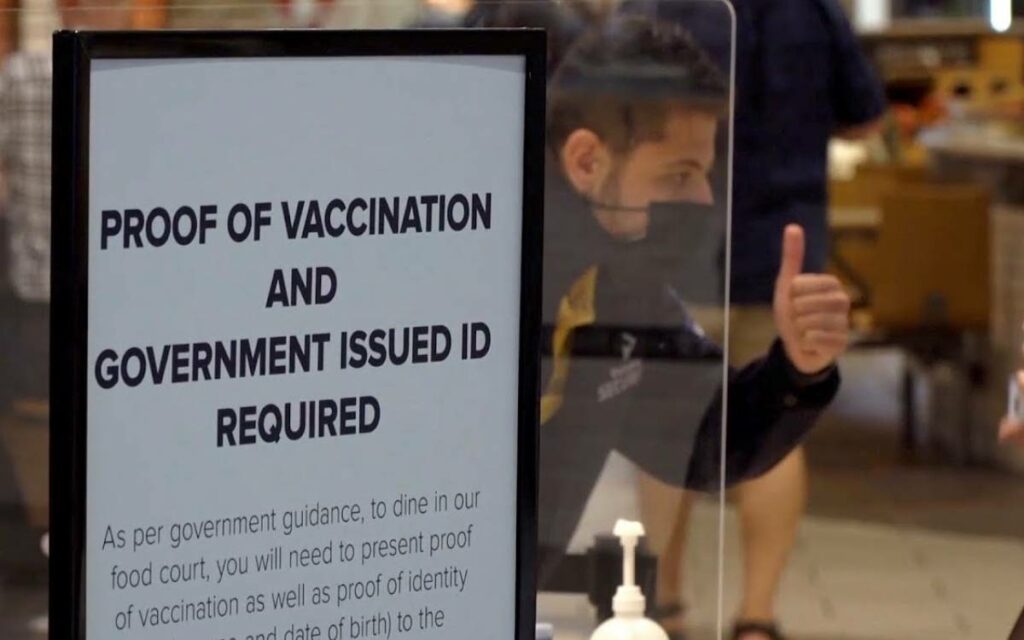
Photo credit: YouTube/The Globe and Mail
On September 1, 2021, Premier of Ontario Doug Ford formally announced that residents will require full vaccination and status documentation to access certain businesses effective September 22, with a full digital version coming this fall on October 22. This can’t come soon enough.
A provincial government news release notes that requiring proof of vaccination in business settings reduces risk and is an important step for encouraging all Ontarians to get their shot, which is critical to protecting the province’s hospital capacity.
The Ontario and national business sectors have been strong and vocal supporters of vaccine verification as a tool to ensure we keep businesses open and avoid earlier lockdowns. A release from the Ontario Chamber of Commerce noted they support the implementation of a provincial vaccination certificate for high-risk indoor settings that is verifiable, secure, standardized, and accessible, as recommended by the Ontario Science Table.
As we are now experiencing the fourth wave of COVID-19, vaccination is the most effective risk mitigation tool against further resurgence of the virus.
A well-designed vaccine passport system can assist in the prevention of a fourth province-wide lockdown that would have devastating consequences for many small business owners and the Ontario economy. Monitored entry into high-risk commercial spaces are critical for preventing viral spread, protecting our most vulnerable groups, and ensuring the success of our economy.
Current data has also demonstrated that provinces implementing a vaccine documentation program will experience higher economic growth, greater consumer and business confidence, and reduced risks of further lockdowns.
In late August, economists at TD Bank warned that provincial governments across Canada that refuse to implement vaccine passports will be harder-hit by a fourth wave of COVID-19. The financial institution warned they could cut fourth-quarter forecasts for provinces that fail to release plans for limiting high-risk activities among people who are not vaccinated. Those regions are likely to resort to further lockdowns or other activities that restrict business activities and the economy.
In early August, nearly a month before the vaccine passport announcement from Queen’s Park, the Canadian Chamber of Commerce indicated that digital vaccination certificates would help prevent future waves of the pandemic from forcing a resurgence of financially disastrous lockdowns by enabling those with low risk to move within their communities and beyond.
Perrin Beatty of the Canadian Chamber of Commerce noted that the private sector, like Canada as a whole, is diverse. However, one factor that unites business is that no one can afford another across-the-board lockdown. Increasing the rate of vaccination among the Canadian population would be ideal but certificates could also protect people’s health without inflicting major social or economic damage from the Delta and other potential new variants.
Digital certificates are also critical for international travel to provide proof of status for other countries that want to ensure visitors meet their vaccination requirements. Paper documents can be easily forged so machine-readable material is required to meet globally accepted standards.
Certification will also help to assure employees and customers that it is safe to return to work or visit places of businesses with rapid testing as a supplement.
The British Columbia Chamber of Commerce is also a proponent for vaccine passports, arguing the system is an important step in helping businesses keep employees, customers, and patrons safe while rebuilding consumer confidence and restoring business. However, the Chamber believes the rules must be carefully decided without the onus falling upon business.
The Ontario Chamber of Commerce has noted there remains a significant opportunity for the Ontario government to provide further guidance to the business community particularly around workplace vaccination policies for employees. There is widespread concern around a lack of clear guidance that will disproportionately impact small business and lead to a patchwork of inconsistent policies across the province.
Clarity must be provided around what constitutes accommodation, how the technology can be used for employees, timelines, enforcement, and other considerations.
There is still work to do within the federal and Ontario governments on vaccination documentation and protecting business, their employees, and customers. Though, current programs are a major start in avoiding any further lockdowns and business disruptions.
In the meantime, do your part to get past and beat COVID-19. Get vaccinated.

Ian McLean is President and CEO of the Greater Kitchener Waterloo Chamber of Commerce and Chair of McLean and Associates. He is the host of ‘Business to Business’ on 570 News and was previously a columnist at the Waterloo Chronicle. McLean served as City of Waterloo councillor from 2003 to 2010, chairing the finance and strategic planning committees during his tenure.




















